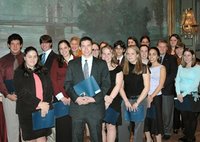
By Kathi Scarpace
One thing that always puzzles me at Advent is the dissonance I feel between the liturgical season of Advent and my ordinary life.
Advent is a quiet time, with its rich, dark colors of purple and blue. Advent means “coming” as I learned in school. My temperament is drawn to this season, but my life is not.
I always feel tension during Advent because I am decorating my home, buying presents, putting up outdoor lights and in general, enjoying the pre-Christmas blur. I understand that the commercialization of Christmas has made buying things before Christmas more important than preparing for Christ, and I always feel sad when the season seems to end for people so abruptly on December 26.
Still, I just can’t get myself into Advent in the quiet way.
So I stand in the middle. I want to enjoy both Advent and Christmas. I want to linger over the Christmas season as the church offers, but I also want the fun of preparing for Christmas with holly and hoopla.
I wonder if other people who come to Mass on Sunday find themselves disconnected, too. How do those of us who do not live in monasteries relate to the Advent season, or any liturgical season, for that matter? It doesn’t seem enough to put an Advent wreath in the middle of the table.
Perhaps some way of linking the everyday experience of Christmas preparations with Advent would help. The outreach to the poor that many parishes sponsor during Advent seems one way to link buying presents with faith.
The hymn, “Good King Wenceslas” is a link with caroling and faith. The loving search for the “perfect present” might recall the preparations the magi made before the journey to Bethlehem. They, too, brought the perfect gift for the Christ Child.
Jesus the Light of the World shines through all the glitter and glam. Even though many do not recognize him as the Light, the beauty of the twinkling lights preaches the good news that he is with us, even on our darkest days.
“Taste and see the goodness of the Lord” can be the anthem when we bake and share sweets with one another. Christmas cards, like the beautiful feet announcing good news, bring friendship and love in their envelopes.
Linger long after the last present is unwrapped and enjoy the Christmas season. But the wonderful days of Advent are still filled with joy. No need to feel sorrow and gloom.
The Lord has come, even into shopping malls and Christmas tree lots.





